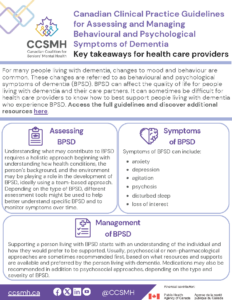BPSD – Clinical Guidelines
For Health Care Professionals
Find clinical tools and resources to support your patients.
For Older Adults & Care Partners
Explore ways to support mental health and well-being for yourself and loved ones.

Canadian Clinical Practice Guidelines for Assessing and Managing Behavioural and Psychological Symptoms of Dementia
These guidelines provide evidence-based recommendations to assess and manage BPSD.
The Guidelines are intended to:
1 ) Inform shared decision-making among people living with dementia, caregivers of people living with dementia and health care providers (i.e., nurses, family physicians, specialist clinicians, and providers from other health disciplines), in Canada; and,
2 ) Support health care leaders, policymakers and researchers to understand future areas to develop health services and interventions to prevent and reduce BPSD.
Meet the Team
In January, 2023, a Working Group was formed to develop and synthesize the guidelines. This group consists of interdisciplinary leading subject matter experts across Canada in the field of dementia. Members met monthly to advance this work by offering their clinical expertise, evaluating research evidence, voting on recommendations, and drafting the guidelines. The guideline development also included input from individuals from across the country with lived experience with dementia or informal caregiving experience to older adults with dementia.
Watch the webinar presenting the BPSD guidelines (March 2024)
Presented by Dr. Dallas Seitz and Dr. Jennifer Watt , leads of the BPSD guidelines.
Discover the key takeaways from the guidelines
Want to know more about key recommendations from the clinical guidelines? Print this infosheet for an at-a-glance reminder in your office and share it with your colleagues.


Do you support someone experiencing changes in mood or behaviour related to dementia?
The Behaviours in Dementia Toolkit is a brand-new online library of over 300 free, practical resources that can help you better understand and compassionately respond to dementia-related changes in mood or behaviour.


